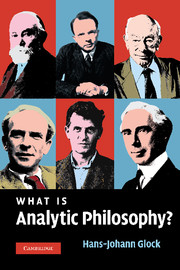8 - Contested concepts, family resemblances and tradition
Published online by Cambridge University Press: 05 June 2012
Summary
Geo-linguistic, historiographical, formal, material and ‘ethical’ conceptions of analytic philosophy have all been found wanting. Have we reached the end of the line? We certainly face an impasse. It may seem that we are forced to conclude (with Preston 2004) that analytic philosophy does not constitute a distinctive phenomenon. At the very least it looks as if we have to agree with Leiter when he claims: ‘I don't think anyone knows what “analytic philosophy” is’ (2004b).
Fortunately, we do not have to throw in the towel quite yet. So far we have considered different kinds of analytic definitions of analytic philosophy, definitions in terms of conditions which are individually necessary and jointly sufficient for being part of analytic philosophy. But there are legitimate concepts that do not allow of an analytic definition. Indeed, we have encountered such concepts in our odyssey up to this point. Neither the family resemblance concepts that feature in Wittgenstein's later attack on his youthful quest for the essence of language (ch. 2.5) nor the genetic concepts central to Williams' argument in favour of historicism (ch. 4.2) are defined analytically. What is more, there is yet another possibility. It arises straight out of the rationalistic conception discussed in chapter 6.5. That conception in effect turns ‘analytic philosophy’ into an honorific title, one that signifies what has come to be known as an essentially contested concept.
- Type
- Chapter
- Information
- What is Analytic Philosophy? , pp. 204 - 230Publisher: Cambridge University PressPrint publication year: 2008
- 1
- Cited by

